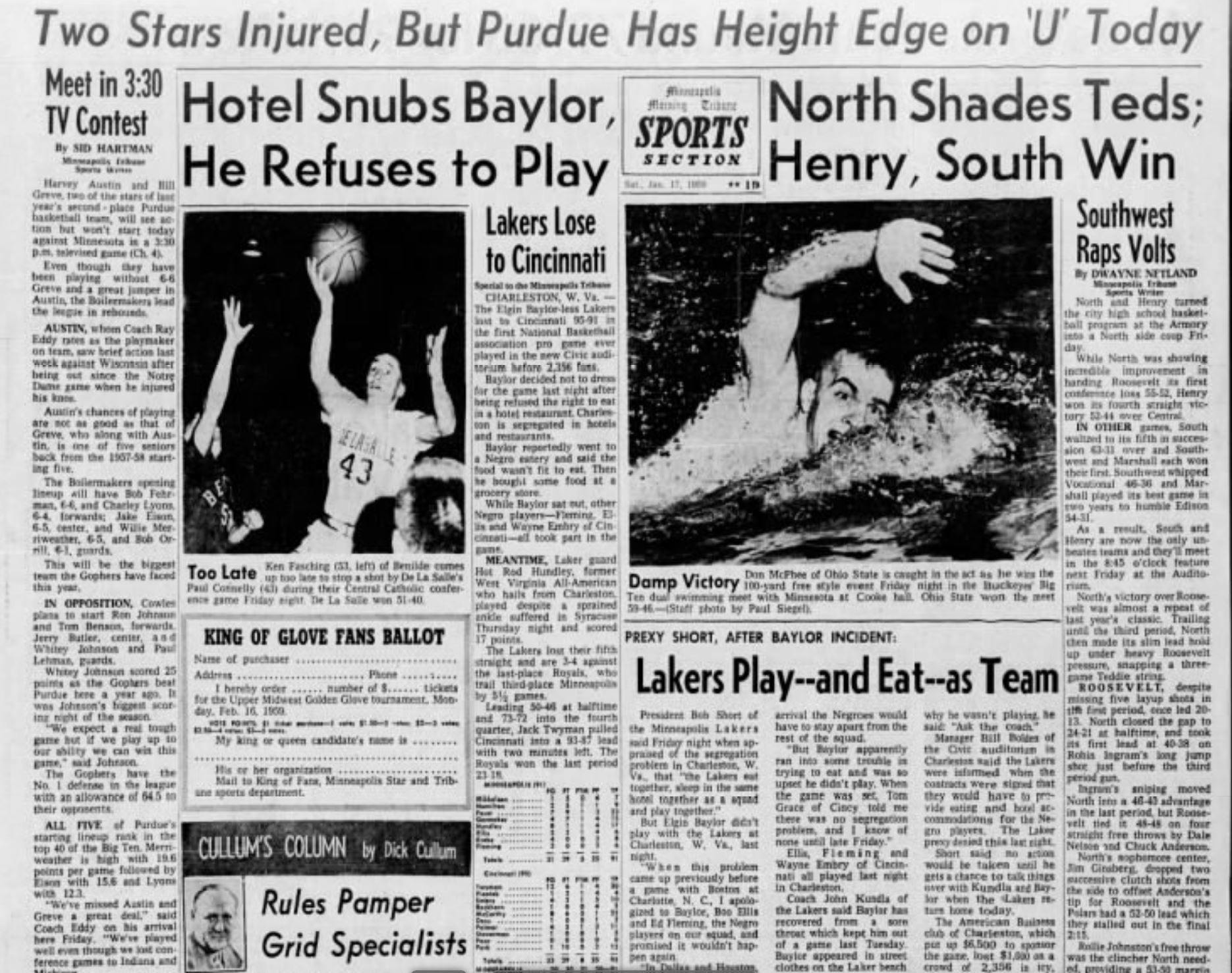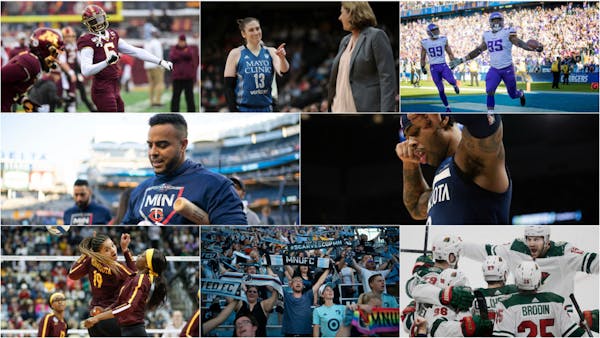 See
more of the story
See
more of the story
The decision by NBA players to strike and not play six playoff games on Wednesday and Thursday nights in protest over racial injustice shouldn't have come as a surprise to anyone who follows the league.
I worked in the NBA as a general manager for the Minneapolis Lakers from 1947-57 and have followed the league for my entire career.
Many NBA players have been some of the most thoughtful and powerful members of the African-American community and they have taken hard stands for what is right going all the way back to the start of the league.
One of those stands took place with the Minneapolis Lakers in 1959, when then-rookie Elgin Baylor refused to play against the Cincinnati Royals in a neutral-site game in Charleston, W.Va., on Jan. 16.
The game was arranged in part because Charleston native Hot Rod Hundley was in his second season with the Lakers. At the time West Virginia was segregated, meaning Blacks were forced to stay in different hotels and eat at different restaurants than white people.
The Lakers were staying at a local hotel, where they were told the team would not be segregated, but they refused to serve food to Baylor and Black teammates Ed Fleming and Boo Ellis.
So the Lakers rookie sat out the game, which was meant to be a big civic booster for West Virginia at a new basketball arena. The Lakers lost 95-91.
The front page of the Star Tribune the next day read: "Hotel Snubs Baylor, He Refuses to Play." It would dominate the local sports news for days.
Star Tribune staff writer Halsey Hall caught up with Baylor at the airport when the team returned to Minneapolis.
"I would do the same thing again," Baylor said.
Was he worried about a fine?
"I would have done it if it had cost my whole year's salary."
Bob Short, who had just taken over as Lakers owner, said the situation was the fault of the Royals, who had moved the game to West Virginia.
"The whole incident is the result of misrepresentation to us by Tom Grace, the Cincinnati president, whose home game it was. He asked permission to transfer the game to Charleston and I only agreed on the assurance that the team would stay together and eat together."
Believes in principles
When Short was told of Baylor's remarks, he said: "That shows there's a guy who believes in principle. I do not argue with principles."
Baylor told the Star Tribune the racism at the hotel was clear from the beginning.
"We go up to the desk to register and I want to find out my room," Baylor recalled. "The clerk said, 'The three colored boys will have to go somewhere else.' "
Then the clerk turned to Lakers coach John Kundla and said, "This is a nice respectable hotel and we can't take the colored boys."
Hundley was incredibly upset at the treatment of Baylor, Fleming and Ellis. The team eventually left the hotel together, and Baylor decided not to play.
"I think all our teams should bypass the South until they are ready to accept us all together," he said.
Support came
One of the only good things to come out of the situation for Baylor and the Lakers was the support that came from the NBA and the Minneapolis community.
NBA President Maurice Podoloff was dealing with protests over the game from the Lakers, who felt the loss should be voided because of what happened to Baylor, and from the Charleston American Business Club, which was upset Baylor didn't play in the game.
Podoloff publicly sided with Baylor, and the league ultimately made a rule that teams would not play in segregated states unless the teams were guaranteed shared accommodations for all players.
Locally the response was huge. When the Lakers returned home to face Philadelphia at the Armory in downtown Minneapolis, they drew 7,156 fans. In their previous home game against the Knicks, they had drawn 4,813.
In his Minneapolis Tribune column after the game, Dick Cullum wrote that Minneapolis showed a great deal of support for Baylor: "How the town felt about it was indicated when the Lakers next appeared at home. For their game with Philadelphia Sunday the unexpected rush of fans swamped the box office and fully taxed the capacity of the Armory."
All-time great
Baylor dealt with the spotlight of the situation incredibly well for a rookie, both on the court and off.
He would average 24.9 points per game in 1958-59, at the time the most in NBA history by a rookie. He won Rookie of the Year and helped lead the Lakers back to the NBA Finals for the first time since 1954.
When I was still GM of the Lakers, we started tracking Baylor all the way back in 1955 at the College of Idaho and drafted him the following year, but Baylor opted to play at Seattle University instead.
He averaged 32.5 points and 19.3 rebounds per game as a junior and took the club to the national championship game against Kentucky in 1958.
Wildcats coach Adolph Rupp told me when the Lakers drafted Baylor they had landed an unstoppable player.
"I've never seen a better rebounder," Rupp said. "He was great on a one-man college team where everybody could set their defense to stop him. In the pro league, Baylor will be playing with four other good men. The defense won't be able to concentrate on the boy. This will make him even greater than he was in college."
Rupp ended up having to rethink a lot of his own prejudiced thoughts and bad habits that gave him a lot of trouble in his life. But that prediction about Baylor turned out to be true. There are few players that have had better NBA careers.
He averaged over 30 points, 15 rebounds and four assists in two seasons — the only other players to do that are Kareem Abdul-Jabbar and Wilt Chamberlain.
He was a first-ballot Hall of Famer and remained a world-class member of the NBA as a player, coach and general manager for 50 years.
And the fact is that if local businessman Morris Chalfen had been able to get a basketball building built to replace the Armory, he would have never sold the Lakers to Short and they might have never left Minneapolis. Baylor's Hall of Fame career and admirable stances for fairness would have continued here.
Sid Hartman can be heard on WCCO AM-830 at 8:40 a.m. Monday and Friday, 2 p.m. Friday and 10 a.m. Sunday. • shartman@startribune.com








